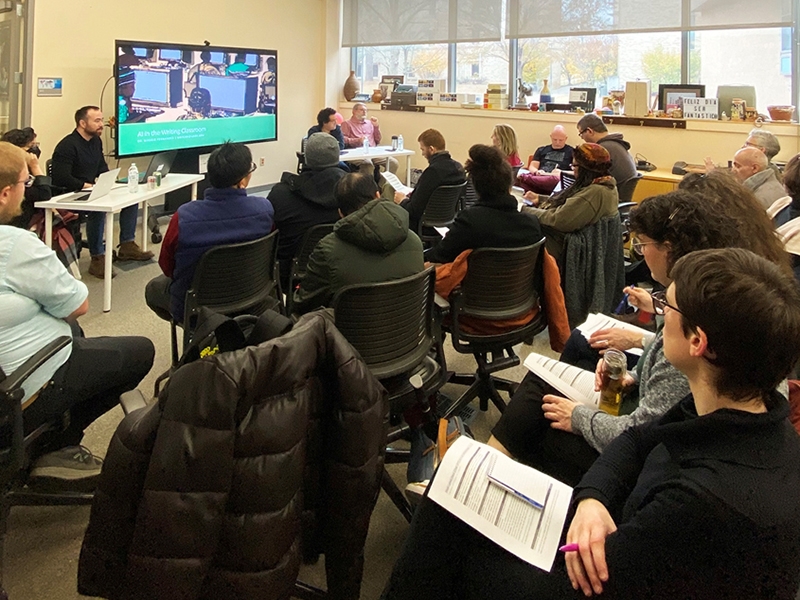The DH Meet-Up: Final Meeting of the Fall Semester Recap
On Thursday, Nov. 30, the Digital Humanities Meet-Up held its final meeting of the semester at the World Languages and Digital Humanities Studio (JBHT 207) on "AI in the Classroom."
This meet-up was the third session of an interdisciplinary three-part series on AI. The other two meet-ups, "AI and Society" and "AI and Storytelling," were held earlier this semester. A recording of “AI in Society” is available on the Studio page of the WLLC website. The focus of "AI in the Classroom" was to share recommendations with AI tools based on actual classroom experiences on the U of A campus.
The meet-up featured a panel discussion composed of three U of A faculty and one graduate student: Ken Muessig from Global Campus; Maggie Fernandes from English; Curtis Maughan from World Languages, Literatures & Cultures; and Guillermo Pupo Pernet, a Spanish TA from the Comparative Literature & Cultural Studies doctoral program.
Muessig shared how Global Campus has integrated the use of ChatGPT through researching pedagogical uses for integrating the tool for instructors and students, noting in particular how instructors will not only need to know how the tool can and should work for students, but also teach students how to use the tool effectively as well as provide accessibility to all students to use ChatGPT. Muessig explained that instructors must create boundaries on using AI and highlighted the importance of integrating these boundaries with academic integrity standards.
Fernandes, an assistant professor of rhetoric and writing, focused on the writing classroom and discussed the concern of AI "flattening" language in the writing classroom due to algorithmic oppression and the impact on research writing. Fernandes also raised the concern of the potential for exploitation in technology creation, stolen art and linguistic justice. On the student-facing side, Fernandes discussed intellectual property and data privacy, while on the instructor-facing end she discussed plagiarism, authorship and academic integrity. Yet, on the positive end, Fernandes shared how letting students explore AI technologies (such as ChatGPT) and become familiar with prompt engineering can help combat these concerns. She concluded with the notion that AI does not create new problems, necessarily, but is instead new technology that all within academia - instructors and students alike - should become familiar with to find solutions to potential problems.
Pupo Pernet, a Ph.D student in classical studies and Spanish teaching assistant, shared his use of using AI technology as both a student and instructor. He shared that AI can help improve critical thinking skills (observation, analysis, inference, communication and problem solving) with correct usage. As a non-native English speaker, Pupo Pernet has utilized AI as a guide with respect to proofreading and argument anaylsis in a non-generative fashion; he has used it as more of a "sounding board" for developmental editing purposes. For example, using ChatGPT to determine if a research paper lacks a specific writing convention or clarity. As an instructor, Pupo Pernet has utilized ChatGPT as a tutor and prompt creation tool for his Spanish students.
Studio Director Curtis Maughan, also a teaching assistant professor of digital humanities, talked about the AI unit in his fall 2023 course "Intro to Digital Humanities." Through close readings and class discussions, students learned how large language models are created, how training data is developed and openly discussed the consequences of artificial intelligence in multiple realms. Topics such as authenticity, factual correctness and citing came up as the class navigated the opening unit of the course. The course featured guest lecturers such as Carter Buckner, a computer science Ph.D. student; Terrius Bruce, a Ph.D student in sustainability; and Chy'Na Nellon, a Ph.D student in comparative literature and cultural studies.
Although the Digital Humanities Meet-Up has come to an end for the fall semester, the workshops will return for spring 2024. All DH Meet-Ups are free and open to the U of A community. The WLDH Studio will announce the spring lineup following the winter break. To stay in the loop, please follow Department of World Language, Literature and Culture's social media sites linked below and the WLLC website!
-
WLLC Instagram: http://www.instagram.com/uarkwllc
-
WLLC Facebook Page: http://www.facebook.com/uark.wllc
-
WLLC Website: http://languages.uark.edu
Topics
Contacts
Cheyenne Roy, assistant director
World Languages and Digital Humanities Studio
479-575-4159,
ceroy@uark.edu
Headlines
PetSmart CEO J.K. Symancyk to Speak at Walton College Commencement
J.K. Symancyk is an alumnus of the Sam M. Walton College of Business and serves on the Dean’s Executive Advisory Board.
Faulkner Center, Arkansas PBS Partner to Screen Documentary 'Gospel'
The Faulkner Performing Arts Center will host a screening of Gospel, a documentary exploring the origin of Black spirituality through sermon and song, in partnership with Arkansas PBS at 7:30 p.m. Thursday, May 2.
UAPD Officers Mills and Edwards Honored With New Roles
Veterans of the U of A Police Department, Matt Mills has been promoted to assistant chief, and Crandall Edwards has been promoted to administrative captain.
Community Design Center's Greenway Urbanism Project Wins LIV Hospitality Design Award
"Greenway Urbanism" is one of six urban strategies proposed under the Framework Plan for Cherokee Village, a project that received funding through an Our Town grant from the National Endowment for the Arts.
Spring Bike Drive Refurbishes Old Bikes for New Students
All donated bikes will be given to Pedal It Forward, a local nonprofit that will refurbish your bike and return it to the U of A campus to be gifted to a student in need. Hundreds of students have already benefited.





